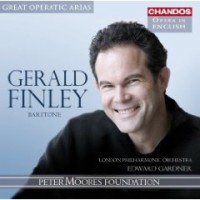
I have heard Gerald Finley live and enjoyed his singing immensely. He possesses a strong, resonant, lyric baritone, even of scale and beautiful of timbre. His biggest successes to date have been creating the roles of Oppenheimer in John Adams‘ Dr. Atomic and Harry in Mark-Anthony Turnage‘s The Silver Tassie. He includes selections from both of these operas on his new CD Great Operatic Arias: Gerald Finley
, and they are terrific. But unlike a lot of singers who specialize in contemporary music, Mr. Finley is just as good in traditional operatic repertoire. In fact, I have always thought he was the natural successor to another great lyric baritone, Thomas Allen.
I was expecting a CD containing much of the standard, lyric baritone repertoire (Nozze di Figaro, Giovanni, Onegin, Puritani, Barbiere, etc.), with some interesting 21st Century additions and a few esoteric selections thrown into the mix. What I was not expecting was Iago’s “Credo” from Otello. “Verachtet mir die Meister nicht” from Die Meistersinger, and Scarpia’s “Te Deum!”
It’s not that the repertoire on the CD is unexpected, it is that so much of it is blatantly inappropriate. If Finley sang these pieces spectacularly, or brought some interesting musical or dramatic insight, I would at least be intrigued by the choices, but he doesn’t. And I’m getting ahead of myself. So, from the beginning.
Let me say right off the bat that I am not a fan of opera being sung in English when it wasn’t written in English. I won’t say this CD made a believer of me, but I will say that the English translations from various sources are not only accurate, but poetic and immensely satisfying. I particularly enjoyed Andrew Porter’s remarkable rendering of the “Credo” from Verdi’s Otello. In fact, I liked the translation a lot more than the performance.
The recital begins with beautiful performances of Robert’s Aria from Tchaikovsky’s Iolanta, Lysiart’s Aria from von Weber’s Euryanthe, and Oppenheimer’s big number from Dr. Atomic. Great. Then the first curve-ball: Iago. As you would expect, Finley sounds pushed, taxed, effortful, and over-extended by the demands of Verdi’s vocal writing. Particularly annoying is the tendency of his vibrato – already on the fast side – to change to a bleat when under this kind of unrelenting pressure. (I was appalled to see that Finley is actually singing the role in concert with Sir Colin Davis conducting. Sir Colin should know better.)
Things improve greatly with the Tannhäuser arias, a duet from Don Giovanni, and the Silver Tassie excerpt. Wolfram doesn’t have to be a dramatic baritone to be good – I’m thinking specifically of some terrific performances I saw Hakan Hagegard give at the Met in the 1980s – and Finley brings beautiful tone and elegant phrasing to these selections.
Next is the Toreador Song from Carmen (in a great translation by David Parry). Finley is on less secure footing here – not a surprise – and the vocal demands wear him down. Next is the Meistersinger selection, and, giving the devil his due Finley sings it with great warmth and feeling, but come on…..
A really beautiful performance of Antonio’s aria from Linda di Chamounix is followed by a pushed, taxed, effortful, over-extended, bleaty performance of the “Te Deum, then the recital ends with a lovely “Some Enchanted Evening” from South Pacific. Yes, it’s a bass part, but Finley is perhaps trying to cash in on publicity from the hit revival just now closing in New York, and they didn’t use a bass either.
The baritone is assisted throughout the CD by the superb, incisive conducting of Edward Gardner and beautiful playing of the London Philharmonic Orchestra. Lucy Crowe sounds awful as Zerlina in the Giovanni duet, as do Deborah Miles-Johnson, Emma Brain-Gabbott, and Kathryn Jenkin in the CARMEN.
To sum it up: an uneven recital sabotaged by poor repertoire choices.


























Comments